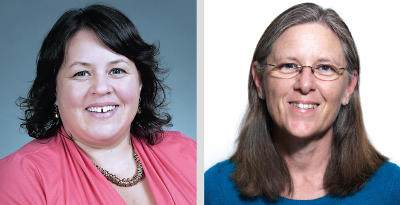Federal Grant Allows Free Training in Collaborative Care
Abstract
The Annual Meeting training is the first step in training psychiatrists under a grant that APA recently received. An ultimate goal is to connect trained psychiatrists and primary care practices in their geographic area seeking to practice in this model.
Free in-person training in collaborative care will be offered at APA’s Annual Meeting in Atlanta, as part of the Transforming Clinical Practice Initiative (TCPI).

Anna Ratzliff, M.D., Ph.D., and Lori Raney, M.D., will be leading the course “Integrating Behavioral Health and Primary Care: Practical Skills for the Consulting Psychiatrist.” Those interested in taking this free course can register when they register for the Annual Meeting.
The TCPI is a $2.9 million, four-year federal grant from the Centers for Medicare and Medicaid Services (CMS). APA is one of just 39 organizations chosen to participate in the TCPI; as one of the Support and Alignment Networks (SANs) awarded under the grant, APA is committed to training 3,500 psychiatrists in the principles and practice of collaborative care, a specific model of integrated care developed by the late Wayne Katon, M.D., Jürgen Unützer, M.D., M.P.H., and colleagues at the AIMS (Advancing Integrated Mental Health Solutions) Center at University of Washington.
The first levels of that training are being offered at APA’s 2016 Annual Meeting and again in October at IPS: The Mental Health Services Conference. The course at the Annual Meeting is titled “Integrating Behavioral Health and Primary Care: Practical Skills for the Consulting Psychiatrist.”
The course will make the case for integrated behavioral health services in primary care, including the evidence for collaborative care; discuss principles of integrated behavioral health care; describe the roles for a primary care consulting psychiatrist on an integrated care team; and apply a primary care–oriented approach to psychiatric consultation for common behavioral health presentations.
The course will also educate psychiatrists on how to engage in TCPI and connect with regional primary care networks that are actively recruiting psychiatrists with integrated care training.
Lori Raney, M.D., chair of the APA Work Group on Integrated Care and a master trainer for the session, told Psychiatric News that the course material mirrors the content being offered by APA in online modules that the University of Washington developed as an initiative of the APA Board Work Group on Health Care Reform.
“The whole course is really built upon the foundational principles of collaborative care,” Raney said. “It’s these core principles that differentiate the collaborative care model from other approaches, and this can lead to disagreement among the different professional organizations. Another less-studied but prevalent model will be presented in the training so that psychiatrists can understand how these models differ, the core features they share, and how some merging of the models could occur.”
Raney issued a special invitation to residency trainers. “Residents are among those who are most excited about this new emerging model, but we need attendings in residency programs who can pass on the knowledge and training.”
Raney will be joined in leading the course by Anna Ratzliff, M.D., Ph.D., of the Department of Psychiatry and Behavioral Sciences at the University of Washington, and John Kern, M.D., chief medical officer of Regional Mental Health.
APA Director of Education Tristan Gorrindo, M.D., said the Annual Meeting trainings are a first step in providing psychiatrists with new skills for working with primary care physicians in the collaborative care model.
“APA’s efforts start with training but then continue to connecting trained members with primary care practices in their area who are looking for psychiatrists to practice in this model,” he said. “We’ll continue to support these psychiatrists with a virtual learning collaborative to help them in applying their training in practice. Many psychiatrists with this training connect with primary care practices for a half-day to one day a week to diversify the ways in which they currently practice.” ■



